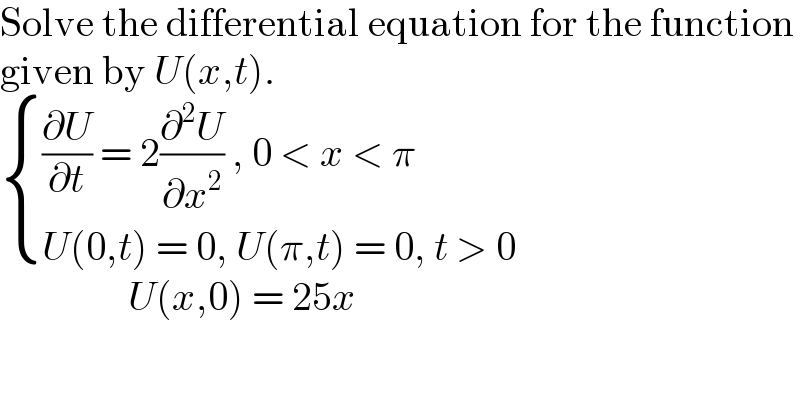
Question and Answers Forum
Question Number 183761 by MikeH last updated on 29/Dec/22

Answered by leodera last updated on 18/May/23
![take fourier sine transform of both sides F_s {(∂u/∂t)} = 2F_s {(∂^2 u/∂x^2 )} let u_s ^− = ∫_0 ^π u(x,t)sin (sx)dx (d/dt)u_s ^− = 2[−s^2 u_s ^− + s{u(0,t) − (−1)^s u(π,t)}] (d/dt)u_s ^− = −2s^2 u_s ^− solving the D.E u_s ^− = Ae^(−2s^2 t) but u_s ^− (s,0) = ∫_0 ^π 25xsin (sx)dx = −((25π)/s)cos (sπ) u_s ^− (s,0) = Ae^(−2s^2 ×0) = −((25π)/s)cos (sπ) ∴ A = −((25π)/s)cos (sπ) ∴ u_s ^− (s,t) = −((25π)/s)cos (sπ)e^(−2s^2 t) taking inverse fourier transform F^− {u_s ^− (s,t)} = u(x,t) = (2/π)Σ_(s=1) ^∞ −((25π)/s)cos (sπ)e^(−2s^2 t) sin (sx) u(x,t) = −50Σ_(s=1) ^∞ (((−1)^s )/s)e^(−2p^2 t) sin (sx)](Q192435.png)
| ||
Question and Answers Forum | ||
Question Number 183761 by MikeH last updated on 29/Dec/22 | ||
 | ||
Answered by leodera last updated on 18/May/23 | ||
![take fourier sine transform of both sides F_s {(∂u/∂t)} = 2F_s {(∂^2 u/∂x^2 )} let u_s ^− = ∫_0 ^π u(x,t)sin (sx)dx (d/dt)u_s ^− = 2[−s^2 u_s ^− + s{u(0,t) − (−1)^s u(π,t)}] (d/dt)u_s ^− = −2s^2 u_s ^− solving the D.E u_s ^− = Ae^(−2s^2 t) but u_s ^− (s,0) = ∫_0 ^π 25xsin (sx)dx = −((25π)/s)cos (sπ) u_s ^− (s,0) = Ae^(−2s^2 ×0) = −((25π)/s)cos (sπ) ∴ A = −((25π)/s)cos (sπ) ∴ u_s ^− (s,t) = −((25π)/s)cos (sπ)e^(−2s^2 t) taking inverse fourier transform F^− {u_s ^− (s,t)} = u(x,t) = (2/π)Σ_(s=1) ^∞ −((25π)/s)cos (sπ)e^(−2s^2 t) sin (sx) u(x,t) = −50Σ_(s=1) ^∞ (((−1)^s )/s)e^(−2p^2 t) sin (sx)](Q192435.png) | ||
| ||